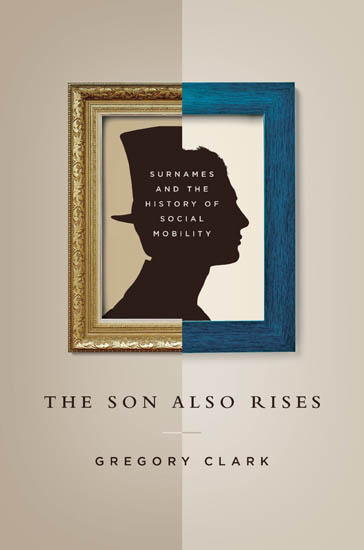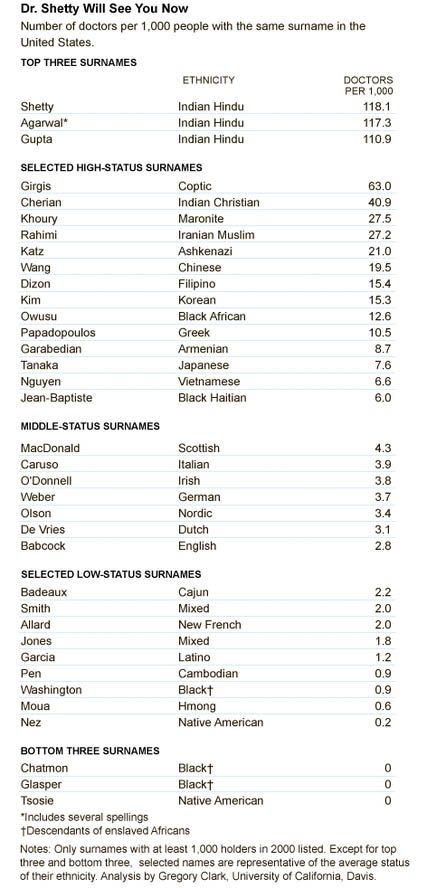The Son Also Rises
F. Roger Devlin, American Renaissance, April 4, 2014
Subscribe to future audio versions of AmRen articles here.
Gregory Clark, The Son Also Rises: Surnames and the History of Social Mobility, Princeton University Press, 2014, 366 pp., $29.95.
Gregory Clark is an economic historian at the University of California at Davis, best known for A Farewell to Alms, a 2007 book about the roots of the industrial revolution. According to Prof. Clark, that momentous change happened where it did — England — and when it did — the 18th century — because British behavior had evolved over the previous six centuries. The most important changes were a decreased propensity to violence and an increased propensity to work and save. Although the book did not discuss genetics or evolution, it was still subversive in its implications: If England’s economic transformation was due to traits that evolved, it is unlikely that a similar breakthrough can be achieved in societies that have not evolved along similar lines. In other words, if Prof. Clark’s thesis is correct, thousands of bureaucrats at such institutions as the World Bank and the International Monetary Fund are wasting their time and other people’s money trying to bring modernity to the Third World.
Prof. Clark has now written another important study disguised by a bad Hemingway knock-off title: The Son Also Rises. The theme this time is social mobility, a pet topic among sociologists: Prof. Clark found 244,000 books and articles online that use the term. Most scholars assume that more social mobility is better, though we must bear in mind that the term refers to downward as well as upward mobility.
The conventional assumption about social mobility is that in the bad old days, a man’s position in society was determined at birth. If you were born a peasant that is what you were destined to remain for life; ditto if you were born an aristocrat. In a hereditary monarchy, even the most important position was determined by accident of birth. If a king happened to be stupid or vicious, not much could be done about it, and millions of subjects suffered.
At the same time, reserves of talent might be wasted because of class prejudice and inadequate opportunity. In his Elegy Written in a Country Churchyard, Thomas Grey reflected on the great statesmen and poets that might have been, but never were, because they had been born, lived, and died in a rustic village:
Perhaps in this neglected spot is laid
Some heart once pregnant with celestial fire;
Hands that the rod of empire might have swayed,
Or waked to ecstasy the living lyre.But Knowledge to their eyes her ample page
Rich with the spoils of time did ne’er unroll;
Chill Penury repressed their noble rage,
And froze the genial current of the soul.
Toward the end of the 18th century all this is thought to have changed. The French Revolution, despite its regrettable “excesses,” opened careers to talent for the first time. The rise of industrialism disconnected economic success from the inheritance of land, and rewarded enterprise and ambition. Modern societies choose their rulers by a rigorous selection process rather than suffer the results of a biological crapshoot.
Even the threat of downward mobility has its good side, in that the captains of industry and politics are never allowed to rest on their laurels. In short, modernity meant the rule of “the best and the brightest,” and replaced classes that were based on birth and kept in power by antiquated prejudice.
One may well wonder whether the likes of Barack Obama, David Cameron, Angela Merkel and François Hollande are really such a great advance over Louis XIV or Frederick the Great. Yet the conventional narrative of the blessings of improved social mobility in modern times is still widely accepted by scholars. Such opposition as it faces usually comes from Marxists. They claim that “fair” competition is an ideological ruse by which the bourgeois order that succeeded the hereditary aristocracy stays in power; the pretense of neutrally selected ability masks the continuing reality of class domination.
This discussion is likely to be forever altered by Gregory Clark’s new book. Prof. Clark tells us that he himself long accepted the conventional view:
Only when confronted with evidence of the persistence of status over five hundred years that was too glaring to ignore was I forced to abandon my cheery assurance that one of the joys of the capitalist economy was its pervasive and rapid social mobility. Having for years poured scorn on my colleagues in sociology for their obsessions with such illusory categories as class, I now had evidence that individuals’ life chances were predictable not just from the status of their parents but from that of their great-great-great grandparents. There seemed to be an inescapable inherited substrate, looking suspiciously like social class, that underlies the outcomes for all individuals.
Prof. Clark found that social status is about 75 percent heritable between generations. In the West, this figure holds for all historical eras, all social systems and all ranks of society; it holds for income, wealth, education and longevity. Most surprising of all, there has been no dramatic rise of social mobility in modern times; previous scholars have both overestimated the degree of social mobility we enjoy today and underestimated that which existed in earlier times.
The Marxists are right: Something “looking suspiciously like social class” still exists. However it is not a result of the “capitalist mode of production” that could be eliminated through revolution. Instead, social status is passed on much like a genetic trait; it remains constant under all sorts of social and political systems.
How did Prof. Clark reach such a conclusion after thousands of sociologists had missed it? He followed the fortunes of particular surnames over the course of centuries, whereas previous studies of social mobility looked at changes in status over two, or at most three, generations. Status always involves a sizeable element of chance, which artificially inflates the appearance of social mobility over just a generation or two. Hence, previous sociologists had estimated the heritability of status at around 40 percent. Using larger datasets over many generations is like calculating a moving average: It cancels out the short-term effects of chance. The picture that emerges is one of considerable short-term social mobility that masks longer-term stability and slow change.
Prof. Clark began his survey with Sweden, a monarchy that once had a privileged aristocracy but has evolved into an egalitarian welfare state. First he selected two sets of names: one set suggested aristocratic background, and the other suggested low status. Examples of high-status names were Leionhufvud (Lion-head), Gylllenstjerna (Golden-star), Ehrensvärd (Honor-sword), and Adlercranz (Eagle-crown). ( Prof. Clark mentions that Shakespeare’s Rosencranz and Guildenstern were common names among Danish aristocrats in the Elizabethan period.) The low-status names were mostly patronymics ending in “-son.”
Prof. Clark then looked at the frequency of both sets of names among doctors, lawyers, and holders of advanced degrees. In both cases he found a slow regression toward the mean. Aristocratic names have gradually become less common in these professions and common names have just as gradually become more common. Yet even today, descendants of counts and barons are far more likely to be in medicine and law than Anderssons or Olsons. Neither the loss of aristocratic privileges, nor the introduction of free and universal education, nor redistributive taxation seem to have changed this pattern.
Many sociologists believe that in much of the Third World “inequality breeds immobility.” This would lead us to expect high social mobility in Sweden, because it is one of the most egalitarian countries on earth. Instead, surname frequency studies show no higher social mobility in Sweden than in less egalitarian countries such as Great Britain or the United States.
Perhaps the most interesting part of Prof. Clark’s book is a comparison between data sets from Medieval and Modern England. In the Medieval period, persons of low status could be identified by artisan names such as Carpenter, Plumber, Thatcher, and Baker. Around the latter half of the 13th century, such names began to be hereditary, and not necessarily related to a trade. There are four groups that can be identified as upper crust: those with surnames derived from place names, those who attended Oxford and Cambridge (there are records since 1170), Parliamentarians (records since 1295), and people whose wills were handled by the country’s highest probate court (records since 1384).
Prof. Clark found that:
Medieval England looks like a world of astonishing mobility. Artisans in 1300 were mostly illiterate workers scattered across English villages, yet by 1500 their descendants were fully incorporated into the English university system. And by 1620 they were fully represented even among the gentry whose wills were proved in the [highest probate court].
Centuries before the French Revolutionaries made a great fuss about opening careers to talent, “the social and economic system of medieval England was delivering equality of opportunity.”
There is a similar pattern of downward mobility for those bearing prestigious names. In the 13th century, surnames derived from place names were over-represented at universities by a factor of four. The figure declined to less than two during the 15th century. Yet a slight over-representation was still detectable as late as the 19th century, before finally disappearing in the 20th. In other words, noble names were losing their luster very early, but it took a long time for that luster to dim entirely. Prof. Clark states that as late as 1979, some Englishmen still thought it odd to be governed by a Prime Minister with a down-market, artisan name like Thatcher.
To explain the patterns he uncovered, Prof. Clark assumes that something he calls “social competence” contributes to higher status. However, someone’s status is also influenced by chance or personal choice. A person of good family with high social competence could go to work for a declining firm that goes bankrupt; or he might become a professor of philosophy, an intellectually demanding career with few material rewards. In both cases, his status will be lower than his underlying social competence.
Conversely, a person of low social competence might join a political party that stages a revolution, which leads to high status. Still, his children are unlikely to have significantly higher social competence than he does, so they will be unlikely to thrive without political patronage. We are all victims of time and chance, but over many generations, social competence is what leads to status. Grey’s Elegy is lovely poetry, but bad sociology: There is no reason to expect large numbers of potential Miltons and Cromwells lying about in country churchyards.
Prof. Clark emphasizes that he has not proven social competence to be genetic, only that it behaves like a genetic trait, exhibiting 75 percent heritability and convergence to the mean. Common sense suggests that social competence would be composed of factors such as intelligence, initiative, and social skills that are known to be heritable. Progress in genetics may soon make it possible to search for a direct genetic cause of the correlations Prof. Clark has found.
Prof. Clark also tested his hypothesis with data from India, China, Japan, Korea and Chile.
As one would expect, the caste system slows social mobility in India. Status persists across generations at a rate of 91 percent, about the highest figure anywhere. Since marriage in India is strongly endogamous within castes, this data may be strong evidence for a genetic contribution.
Prof. Clark includes interesting information on the reservation system for scheduled castes, the Indian equivalent of affirmative action. A large number of spots at universities and desirable jobs are “reserved” for members of certain “scheduled” castes considered victims of earlier discrimination. The list of “scheduled” castes was drawn up carelessly by the British authorities in the 1930s, and includes some groups that were never particularly disadvantaged. They have benefited greatly from the system, while those descended from truly disadvantaged groups have hardly benefited at all. This mirrors the effects of racial preferences in America, where blacks who don’t need affirmative action benefit from it, while the working class and underclass remain unaffected.
One theory popular with sociologists is that social mobility should be higher in ethnically homogeneous societies than in ethnically and racially divided societies such as the United States, where prejudice may hold back talented minorities. Data from highly homogeneous Japan and Korea do not support this view; social mobility is no higher in those countries than it is here.
China, which saw enormous social upheaval in the 20th century, provides yet another perspective. Under Mao, much of the country’s elite was killed or exiled. The rest were subject to discrimination and excluded from the Communist Party. During the Cultural Revolution, Mao tried to turn the social scale upside down by shipping prominent people to the countryside to work in rice paddies. If political intervention can create higher social mobility, it would have done so in China.
Yet once discrimination against “class enemies” was abolished shortly after Mao’s death, those with surnames characteristic of the pre-communist elite quickly began to rise again. Today, they are greatly over-represented even in the Communist Party. Those descended from the “workers and peasants” favored under Mao have quickly seen their status erode. Recent social mobility in China has been no greater than it was under the Emperors.
Data from Chile tell a similar story. The efforts of Presidents Frei and Allende to improve conditions for the poor during the period 1964-73 had no measurable effect on social mobility, while the subsequent Pinochet regime, which reversed these policies, saw no decrease in upward mobility. In Prof. Clark’s words:
Chile serves to confirm the hypothesis that social mobility rates are mainly determined within families and are mostly independent of social institutions. Events which at the time seem crucial determinants of the fate of societies leave astonishingly little imprint in the objective records of social mobility rates.
The 75 percent heritability of status can be traced backward into the past as well. People seldom go from rags to riches — or the reverse — In a single generation. Instead, the wealthiest and most successful people in any society typically come from families who are only slightly less successful, and the most down-and-out from parents only slightly less unsuccessful than they are. Whether you trace someone’s ancestors or descendents, their status tends to correlate with his at around 75 percent per generation, regressing toward the mean in both past and future.
The Son Also Rises closes with some thoughts for parents worried about the future of their children. He describes the weird world of Manhattan private schools that cater to wealthy parents tormented with status anxiety for their children. Such people have their four-year-olds coached to pass the competitive entrance exams required to secure a spot in the kindergartens of these schools; once their child gets in, parents can expect to pay tuition of $38,000 per year for twelve years. On Prof. Clark’s showing, all this is wasted. The fate of such children is determined not by the achieved status of their parents — usually partly due to luck and connections — but by the social competence they inherited at birth. Prof. Clark believes such parents, and all of us, would do better to return to the ancient practice of seeking a mate from a “good family.”
Individual success may be due to good or bad luck, but the overall status of one’s family is more likely to reflect one’s underlying social competence. Once a person has chosen a mate carefully, most of the work is done. Good inherited social competence will do more for children than tuition money and private tutoring.


















